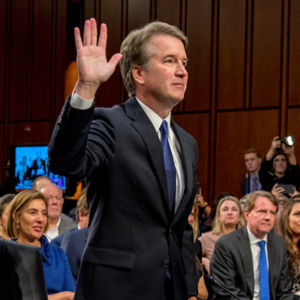Editor’s Note: For an alternative viewpoint, please see: Counterpoint: Men Like Kavanaugh Always Enjoy the Presumption of Innocence; Others Aren’t so Lucky.
On Friday, the Senate will vote on whether the disgraceful new chapter in confirmation hearings that America has been living through for the past few weeks will become the new normal. If it does, we will all — women and men, victims and the accused — be worse off. We will have abandoned an objective standard of justice in favor of a reputation-destroying public firestorm.
The stakes are high: in Judge Brett Kavanaugh we have before us a man whose decades of model public service are in danger of being wiped out by a bare allegation, made about events that took place when he was 17 years old, and contradicted by the only named witnesses.
While Dr. Christine Blasey Ford’s testimony was plausible and sympathetic, it did nothing to bring forward new evidence, nor alleviate the gaps in her story. Those inconsistencies — the changing number of people she claims were at the gathering, multiple revisions to the time and place of the assault, and no way to explain how she arrived home — are what led sexual assault prosecutor Rachel Mitchell, who questioned Dr. Ford at the hearing, to declare Ford’s testimony “even weaker” than “he said, she said.”
Mitchell reports that that no reasonable prosecutor would bring the case to a civil trial, where the standard is that the allegation must merely be more likely than not.
Those claiming to be the victims of sexual assault should always be listened to, and their allegations should always be fairly investigated. But to say we should uncritically believe all women dangerously upends a long-held tenet of both our law and culture: those accused are presumed innocent.
Many in the media would have you believe that women are united against Kavanaugh, making him the stand-in for the many perpetrators of sexual violence who evade justice. But women care about fairness and the presumption of innocence as well as the pain of victims; they see in Kavanaugh their husbands, sons, fathers and brothers. Instead of the entitlement of privilege, many women saw in his righteous anger the anguish of a man whose reputation and family are being unfairly dragged through the mud.
In fact, 60 percent of Americans want to see Kavanaugh confirmed if this FBI investigation turns up no new evidence to corroborate Dr. Ford’s testimony. The divide over his confirmation is breaking down along partisan lines rather than gender, with conservative women furious at the way sexual assault has been wielded as a political club. Americans across the political spectrum are disappointed with the way that Democrats have handled these sensitive matters and turned them into a political circus.
Perhaps that’s why the goalposts for Kavanaugh’s unfitness have been moved so many times, away from the very serious charges in Dr. Ford’s plausible narrative, to the outlandish and sensational.
The national conversation — and what was once the world’s most august legislative body — have been reduced to litigating fart jokes in a high school yearbook and an incident in which Kavanaugh allegedly threw ice at another student in college. Lord help my generation, whose youthful experiences are documented online, if scrutinizing teenage hijinks becomes the norm for career advancement.
More worryingly, if Kavanaugh is not confirmed, the new standard will be set going forward: any accusation of sexual impropriety, no matter how many decades ago and with how little evidence, will be enough to drum a man out of public life if political circumstances are right. This political weaponization of the #MeToo movement will make things worse for victims coming forward, thrusting them immediately into a political melee depending on the party registration of the accused.
When predators like Harvey Weinstein and Bill Cosby were brought down by their victims — and a mountain of corroborating evidence — women across the political spectrum could cheer. If the “Kavanaugh standard” is ratified by a down vote, the common ground between left and right over #MeToo will vanish, leaving in its wake a more difficult task for survivors and a climate of fear for innocent men.
At the end of Dr. Ford’s emotional hearing, the American people were left with two compelling narratives that cannot be reconciled. That’s exactly why the Anglo-American tradition has always demanded some form of evidence and placed the burden of proof on the accuser. If we abandon those long-held standards, we will always be left with the undesirable task of guessing between two injustices: disbelieving a potential victim or destroying an innocent man.

